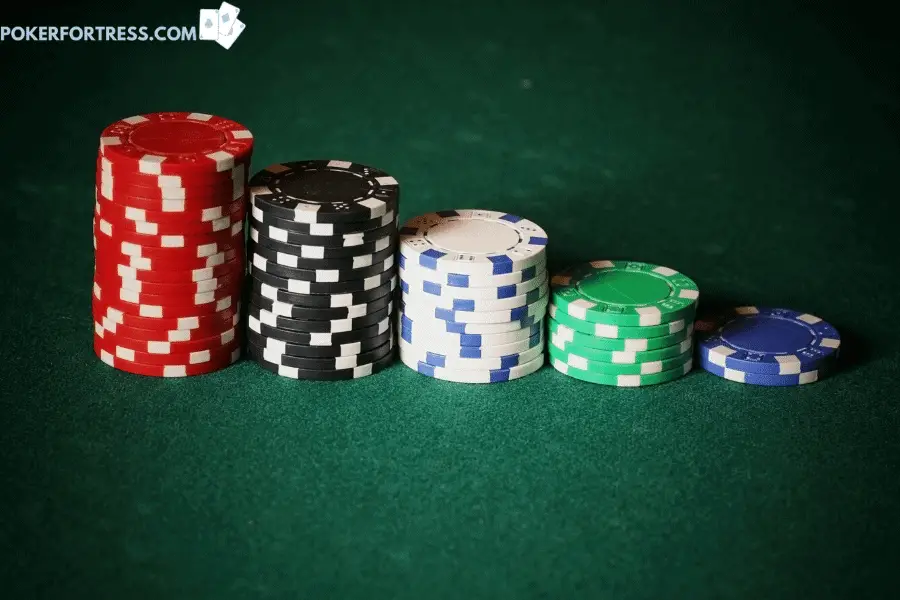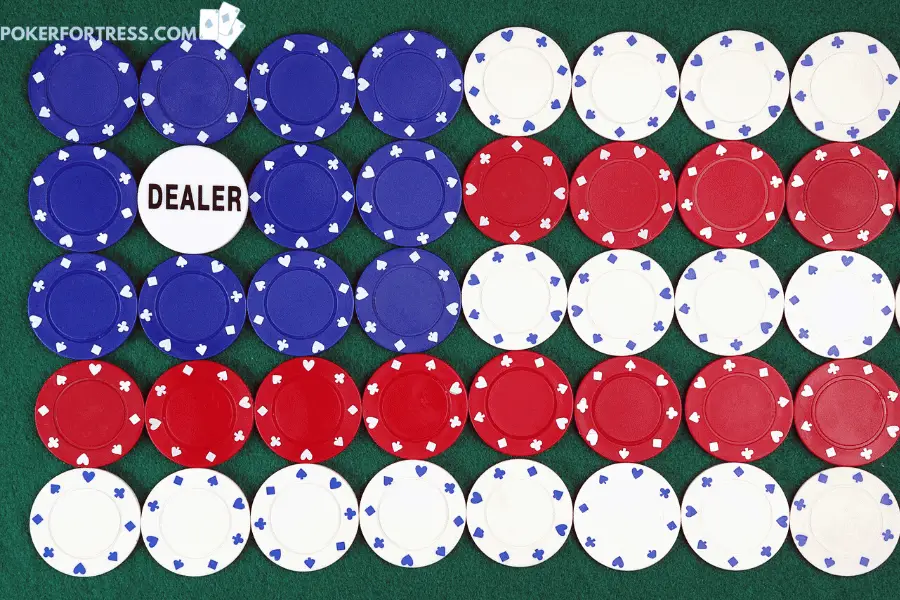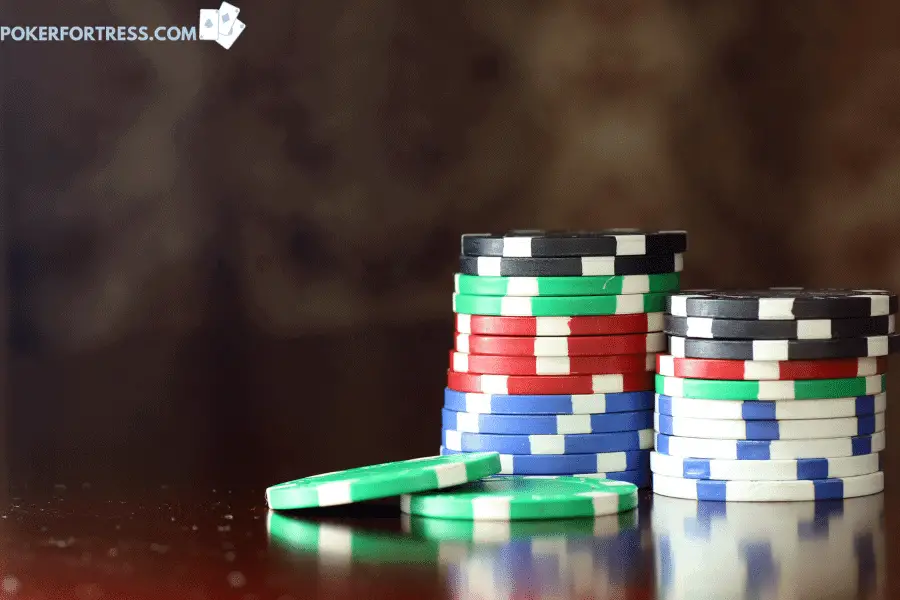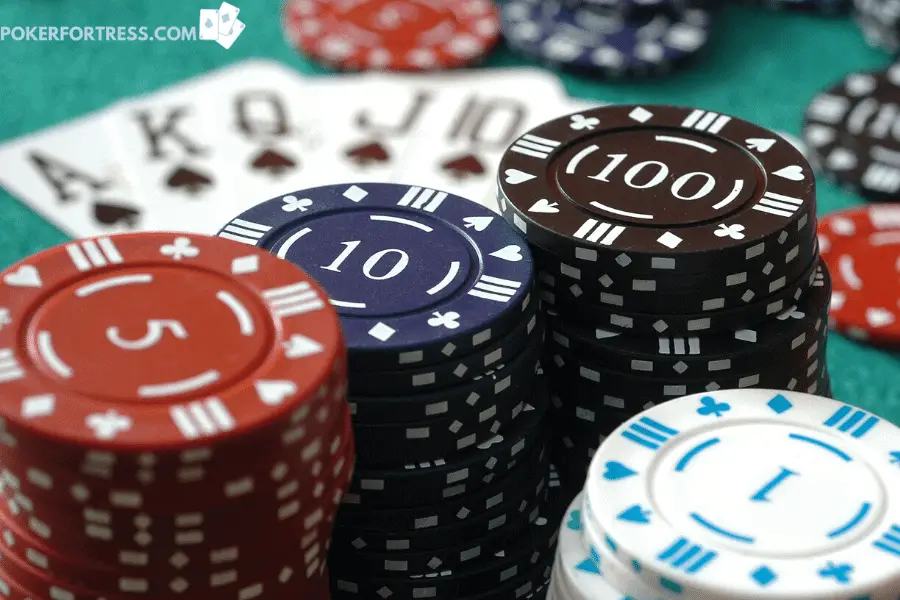Can you imagine yourself playing poker without chips? Those small, round tokens that come in different colors and sizes are a significant part of any poker game. We exchange them with cash, then use these chips as ante whenever we play at a casino.
Poker chips only have value when you’re inside the issuing casino. Casinos aren’t allowed to accept chips from another casino, which is a part of their protocols. Players need to exchange these with cash to start playing, but you have to cash it out for real money before leaving the premises.
Let’s cover everything about poker chips in great detail to help you learn more about it. We’ll even cover some of the reasons why casinos require poker players to use these instead of real money.

The Economy of Poker Chips in Casinos
Whenever you hit the felt, you always need poker chips. It’s a crucial part of playing poker, and the biggest casinos have millions of it in circulation every night. Since it’s the currency that players use when playing poker, and they trade it for cash before and after playing, a casino should remain solvent with equal parts of chips and real money.
The value of chips is 1:1 for the currency that you’re using, regardless of how much you buy. Your $10,000 worth of chips will always be $10,000 as long as you are inside the issuing casino’s premises. If you move to another casino, you won’t get the same value for it. It’ll only be worth the chips of the same color from the same casino.
The only reason why poker chips have their value when you’re inside a casino is trust. When you’re within their premises, you know that every chip in circulation has value because a player exchanged it for real cash. So, when you cash your chips out, you know that the casino has enough money to buy it from you. Without trust, a poker chip loses its value.
When a $500 chip is in circulation, you know that another player funded it before hitting the felt. There’s no way a casino will release a chip, of any value, without another player paying for it. That’s where trust comes in and is the reason why poker chips have a monetary value.
Even if you leave a casino’s premises, a casino poker chip will retain its value as soon as you return, unless they decommission their chips due to fraud or theft.
Poker Chips in Casual Games
You can play casual poker games: non-monetized or with real money, both of which are better with chips. However, each chip’s value depends on the type of game that you’re playing and could, sometimes, even affect the way we play games.

When playing poker with friends, and there’s no real money involved, we use chips of the same color to place our bets. If you plan to have non-monetized games, we recommend the Fat Cat poker set because it doesn’t have any value printed on the chips. It includes 500 chips with five different colors that you use to assign different values according to your liking.
500 chips are enough for a home game with friends. If you are unsure how much poker chips do you need, then read more in this article.
Since poker chip doesn’t have any monetary value, you have to establish a rule on how much each chip is worth. Here is a table that you can use as a guide to assign each color a value:
Non-Monetary Value Guide for Chips
| Chip Color* | Value | Chip Color* | Value |
| White | 1 | Green | 25 |
| Red | 5 | Black | 100 |
| Blue | 10 |
*The colors are based on the chips included in the Fat Cat poker set. Different sets may have different colors for their chips, and some may even have their value printed on them.

White is usually the base color for poker sets, so it’ll always have a value of 1 when playing non-monetized poker games. The rest of the chips from red to black will depend on the value that you assign them. We always recommend using non-marked chips when playing casual games because it gives you the flexibility in assigning values on each poker chip.
Assigning Monetary Value to Chips
Trust still plays an important role when playing poker with friends using real money. If you and your friends agree to monetize your game, each poker chip will only have a value that you and your friends agree. You trust each other that the chips will retain their respective value by the end of the game.
For example, if you agree that every white chip is worth $0.50, and every blue chip is worth $5, then it’ll have that exact value when you cash out your chips. It won’t change throughout the game, and it stands until every player surrenders their chips.
Assigning monetary value on chips depends on the blinds that you’re using for the game. If you’re playing with $1/$2 blinds, your white chips should always have a value of $1. You have to adjust the red, blue, green, and black values, depending on the number of players and chips. Remember, when playing monetized poker, the number of chips in play should be equal to the amount of money paid by the players.
The reason why we recommend the Fat Cat poker set is because it has enough chips to support up to 9 players, as long as you place a value on each chip correctly. Since it doesn’t have a predetermined value printed on the chips, you can assign any number to it to support the number of players that you have and the money in play.

Why Do We Use Poker Chips Instead of Money?
It’s hard to imagine a poker game without chips, but have you ever wondered why we’re using chips instead of real money? After all, it’s easier to reach into your pocket and grab whatever cash you have to start playing, right?
Here are three reasons why casinos and casual games use poker chips:
- The psychological effect of not betting with real money. The biggest reason behind using poker chips is the same reason we use credit cards; chips make it easier for players to bet. There’s too much friction if you’re using real money to play poker, which can affect your decisions. The use of chips makes it easier for you to bet, allowing you to focus on your game.
- Chips are more convenient to use than real money. The issuing entity of the chips can determine each chip’s value, making it easier for players to use. Since each color has a value that often exceeds that of real cash, it also takes up less space when on the table.
- It gives casinos better control over the security of their chips. Today, most casino chips have RFID tags, which provide the casino several advantages over the use of real money. It includes the monitoring of each player’s activities and everything that’s happening on the floor. Aside from this, it also helps the casino prevent any attempt to commit fraud or theft.
Conclusion
Poker chips are worth money, but only when there’s trust. When you’re in a casino, you know that a $500 chip will always be worth $500 because an establishment guarantees its value. The casino will always have enough money to fund the chips because a chip won’t be in circulation unless a player pays for it.
Without trust, a red chip will only be worth one red chip, five white chips, or whatever value you assign to it. You can’t use it to pay for anything, and even if a chip is from a recognized casino, it still doesn’t have any value if you’re using it outside their premises.



